#Kevin Starr
Note
Favorite California history books? Any interesting books on California governors?
First of all, anything by Kevin Starr is a good place to start if you're looking for books on California history. I particularly recommend California: A History (BOOK | KINDLE) for an overall history and Coast of Dreams: California on the Edge, 1990-2003 for a more modern perspective.
Jim Newton's book Man of Tomorrow: The Relentless Life of Jerry Brown (BOOK | KINDLE) is probably the best biography I've read about one of California's most influential Governors. Lou Cannon's Governor Reagan: His Rise to Power (BOOK | KINDLE) is an excellent look at the future President's early political career and eight years in Sacramento.
Mark Arax has written some really insightful books about California's history, culture, and politics, especially West of the West: Dreamers, Believers, Builders, and Killers in the Golden State (BOOK | KINDLE), and The Dreamt Land: Chasing Water and Dust Across California (BOOK | KINDLE).
While they aren't solely about California, I'd also suggest these books, which help tell some of the more important aspects of the story of California: Kearny's March: The Epic Creation of the American West, 1846-1847 (BOOK | KINDLE) by Winston Groom; The Crusades of Cesar Chavez: A Biography (BOOK | KINDLE) by Miriam Pawel; and, Cesar Chavez: Autobiography of La Causa (BOOK | KINDLE) by Jacques E. Levy.
There's another question in my inbox asking for book suggestions about Sacramento, so I'll include those in this answer. Sacramento: An Illustrated History, 1839-1874: From Sutter's Fort to Capital City by Thor Severson is an older book, but really solid about Sacramento's early history. Fool's Gold: A Biography of John Sutter by Richard Dillon, John Sutter: A Life on the North American Frontier by Albert L. Hurtado, and The Associates: Four Capitalists Who Created California (BOOK | KINDLE) by Richard Rayner are good biographies about some of the most important founders of Sacramento.
And you can't tell the story of Sacramento or California (or, really, the United States) without the construction of the transcontinental railroad, so I'd also highly recommend Nothing Like It in the World: The Men Who Built the Transcontinental Railroad, 1863-1869 (BOOK | KINDLE) by Stephen Ambrose, and Empire Express: Building the First Transcontinental Railroad (BOOK | KINDLE) by David Haward Bain.
#History#Books#Book Suggestions#Book Recommendations#California#California History#Sacramento#Sacramento History#Jerry Brown#Governor Brown#Ronald Reagan#Governor Reagan#Transcontinental Railroad#John Sutter#Mark Arax#Kevin Starr
18 notes
·
View notes
Photo
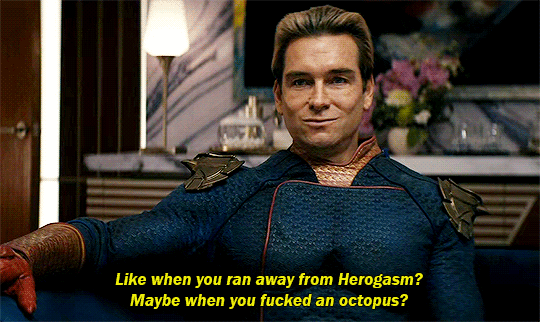

I’ve always tried to help, Sir.
#theboysedit#the boys#homelander#the deep#kevin moskowitz#a-train#reggie franklin#antony starr#chace crawford#jessie t. usher#lmao a-trains face#i wish there had been more scenes with him and the deep#theyre so funny together#one
4K notes
·
View notes
Text
For the most part I want to laser the guy up into tiny pieces and feed them to some starving sea turtles, but sometimes…sometimes, he makes me laugh.
[ @cgi-blowme ]
🎥 Antony Starr’s IG
#homelander#hom3lander#the deep#kevin moskowitz#cgi blowme#the boys#the boys amazon#the boys tv#the boys series#antony starr#chace crawford
34 notes
·
View notes
Text
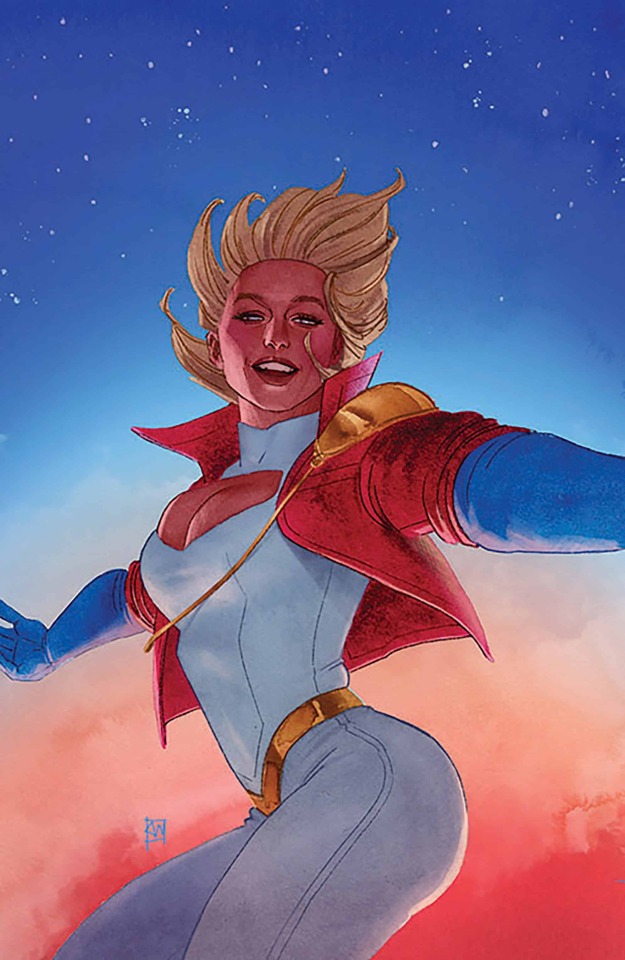
Power Girl (2024) #7 variant cover by Kevin Wada
56 notes
·
View notes
Text
Living The Beatles Legend, by Ken Womack:
____________________________________________
At twenty-six, Mal was much older than the [Cavern's] usual lunchtime crowd [...] “I could sit there for three hours and think maybe 10 minutes had gone by.” Mal took special note of the three vocalists—John, Paul, and George: “They were very high-pitched and there was harmony.” By the time he made his way back up to the street, he was hooked: “I fell in love with them.”
In Lily’s memory, Brian’s job offer was an agonizing prospect for her husband. “He had a lot of sleepless nights, wondering if he should go on with them,” she recalled. “I didn’t want him to. I told him, ‘You’re a person in your own right—you don’t need to follow others.’ But he was starstruck.”
“I was still green at the job of roadie, and the Beatles had been very tolerant with the mistakes I made while settling in and learning my new trade,” Mal wrote. “Mind you, in the first week I worked with them, I was to be fired about seven times, as first one thing then the other went wrong.”


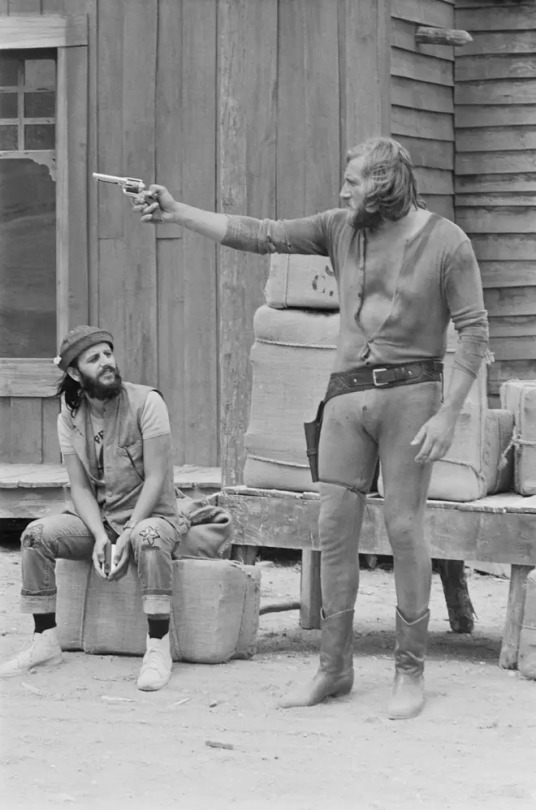
“I’ve been called many things in my life, but it was on the Italian trip that the people backstage called me ‘Mammut.’ I kept thinking it was an Italian version of my name, until I found out it meant mammoth! [...] Everyone I met seemed to be small of stature, and I would see three of them struggling with a heavy piece of equipment, and strolling over, [I'd] take it off them, hoist it on my own shoulders and walk away with it, so gaining my own little admiration society. They thought I was one of the strongest men in the world. And for quite a while after, I got called Mammoth, instead of Mal, by the Beatles.”
“Brian and Neil and I had developed this policy that we wouldn’t pose in photographs with the Beatles,” [Tony Barrow] recalled. “Fans wanted to take pictures of the band, and they didn’t want us hanging around beside the boys.” But Mal had clearly developed a yen, early on, for being as near as possible to the Beatles’ vortex of fame. The flashbulbs and the band’s celebrity were simply too much for him to resist. Consequently, said Tony, “Mal was always in the fucking photographs.”
[...]the Beatles had several more gigs at the Olympia, including a February 1 show where Paul nearly missed his cue, having become enchanted with a woman backstage. With the curtain about to go up, Neil nervously strapped on Paul’s Höfner bass and took his place onstage. At the last moment, Paul leapt into action. But Neil had been ready to make a go of it, and he later scrawled in Mal’s diary that he had been “quite prepared to fake it.”
Victoria recalled following him through “this big, dark club way into the back, and suddenly there’s Paul McCartney, who says, ‘Hello, Vicky.’ And I’m thinking, ‘I could die now and my life would be complete.’ And then we sit down, and Paul orders drinks, and he says, ‘Scotch and Coke, three doubles.’ And I’m thinking, ‘I’m seventeen. I’ve never had a single’.” Poignantly, during her conversation with the Beatle, she remembered looking over at Mal, and “I could tell that he was really happy because he knew what he was doing for me. You know, he knew he was giving me this memory that would last forever.”


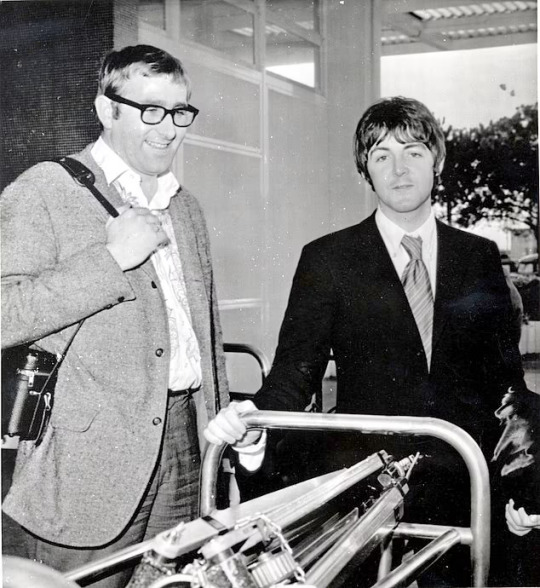
____________________________________________
“[George Martin] admitted to me that when I first joined the group, he was a little antagonistic at somebody else getting close to the Beatles. I understood exactly what he meant, for I have the same feeling for them. One not only gets very protective, but a little selfish and jealous of anybody who gets close to them.”
____________________________________________
“Mal introduced me to my first drug dealer,” [Kevin Harrington] later recalled, “a lovely Caribbean man who lived in Notting Hill. I used to buy an ounce a week for £11, and was told by Mal to put it down on expenses as ‘sweets.’” On two separate occasions, Apple’s Wigmore Street bookkeeper questioned Kevin about the amount he was spending on sweets—that is, until Harrington told Mal about the hassle he was getting from the accounting department. The next time Kevin turned in his receipts for sweets, the bookkeeper merely smiled.
[Mal was] summoned to 7 Cavendish Avenue in the middle of the night after the fans who kept vigil outside Paul’s house dognapped Eddie, McCartney’s Yorkshire terrier. “Mal had to go to the police station to get him back,” Francie recalled. “The girls insisted they wouldn’t release the dog unless Paul came. I talked to them on the phone, and somehow they returned the poor thing. Paul was less upset than I was.”
[Jann] Haworth vividly recalled Mal’s good-natured attitude during their lengthy sessions to stage the cover art. “He was a very sweet person in a world of poseurs,” she said. “Where everyone else seemed fractious and self-serving, Mal was laid-back and genuine.”
“I stayed as close to Paul as I possibly could,” Mal added, although his efforts had nothing to do with protecting the Beatle’s safety. Rather, they were a clumsy attempt to ensure he was photographed along with such A-listers as McCartney and Redgrave. He tried as hard as he possibly could, “but Paul still got photographed by himself!”
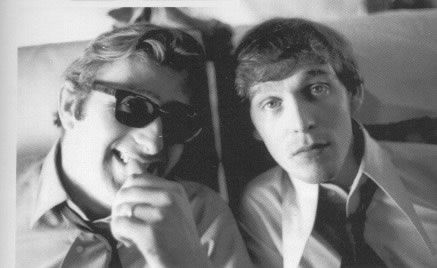

____________________________________________
Mal understood that he was, in a sense, mothering the band members. “I was always making tea, sandwiches, or scrambled eggs,” he said, “just doing anything to look after them, to make sure we kept them working well. The whole thing was, ‘You make the music, and I’ll do anything in the world to make you comfortable’.”
____________________________________________
“I realized that Malcolm lived to please those guys, just like Hare Krishnas live to please their guru. It’s like, ‘I’m going to scrub the banisters, and I’m going to get down on my hands and knees and polish these steps. And then I’m going to do it again, because I want to serve the guru’. That’s how I believe Mal felt about serving the Beatles. They were his guru.” - Victoria, a young girl Mal had an affair with.
By now, despite living in the same city as Mal, Lily knew that she and the children would always come second. “And it was very hurtful,” she later said. Mal would ditch the family for even the slightest hint of Beatle business, and “I would cover up for him, saying, ‘Daddy has to be away for work.’ One day, we were all ready for a family outing to the zoo,” she recalled, “when George rang to ask Mal for a guitar string. Instead of insisting on taking his kids out, he drove off to see George. I couldn’t bear to see the disappointment on [the children’s] faces.”
For several days in advance of shooting the scene, the other, vastly more experienced actors on the set had relentlessly hazed Mal, predicting that he would botch his lines. [...] Ringo heroically came to his friend’s aid, volunteering, in a moment of sublime role reversal, to act as Mal’s “road manager for the day,” tending to his makeup, sating his hunger, and plying him with coffee and tea on the set. In the end, a determined Mal delivered his lines perfectly, admitting that “it was a good day for me, for I love being in front of the camera.”
At the hospital, Mal received fifteen stitches above his left eye, while Harry required several stitches in one of his cheeks. Initially, there was some concern that Mal might lose vision in his left eye. For Mal, there must have been “a guardian angel looking out for fools and drunks,” he reasoned after learning he would retain his sight. “It must have been funny for the hospital staff,” he added, “because when they were stitching me up, I remember lying on the table chanting the Hare Krishna mantra, feeling no pain whatsoever, but poor old Harry was having a terrible time on the next table, shouting and kicking.”
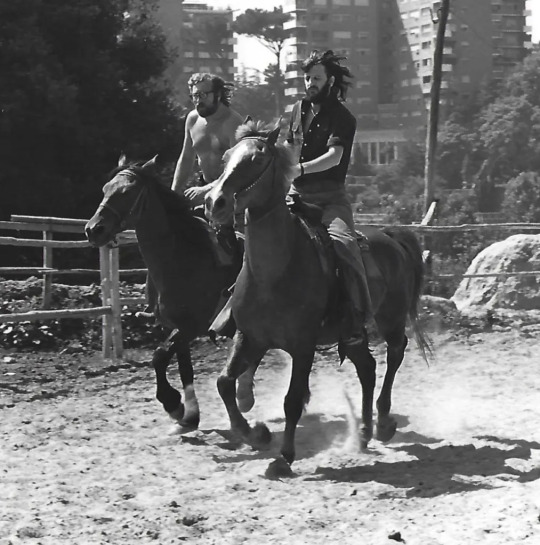

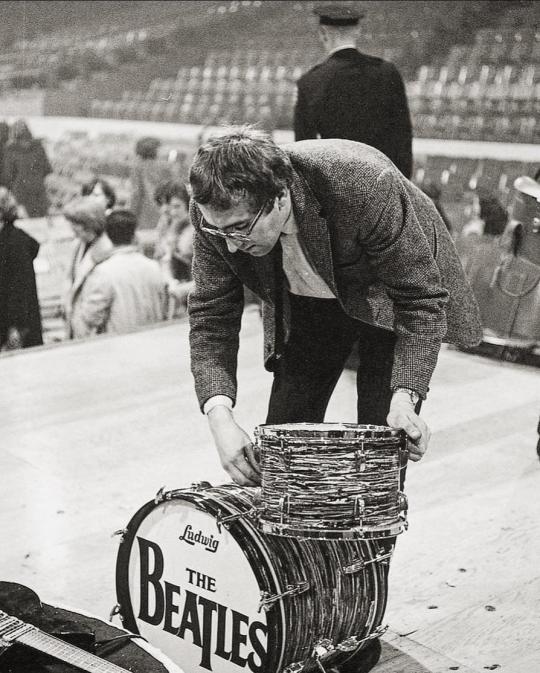
Harry Nilsson remembered a particularly madcap evening at the hotel when he spotted Mal attempting to console John, lost to another bender. “One night he was crying on Mal Evans’s shoulder, saying, ‘I was always a good boy. I was always a good boy,’” Nilsson recalled. “And Mal said, ‘Right brother, you were always a good boy.’ And I told him, ‘What is this horseshit? Stop being a baby. You’re being a baby.’ ‘Well, if you don’t like it, you can get the fuck out!’ John yelled. ‘Well, all right,’ and I slammed the door, and I was crying.”
____________________________________________
“I want the four of them to love my book. That’s my whole dream. My whole dream would be realised if they said, ‘I love what you’re doing’.”
____________________________________________
#beatles books#mal evans#long post#sorry#the beatles#beatles#paul mccartney#john lennon#harry nilsson#ringo starr#kevin harrington
36 notes
·
View notes
Text
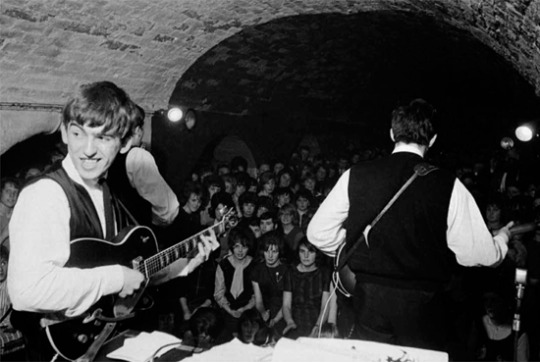

John Lennon, Paul McCartney and George Harrison onstage at the Cavern Club, August 22, 1962. Granada Television visited a lunchtime session that day and The Beatles were filmed for the first time.
ㅡ From the book "The Beatles: British Broadcasting Corporation (BBC Archives)" by Kevin Howlett.
#john lennon#paul mccartney#george harrison#ringo starr#the beatles#60s#1962#the beatles bbc archives#kevin howlett#my:read
98 notes
·
View notes
Text
"THE BLACK DAHLIA" (2006) Review
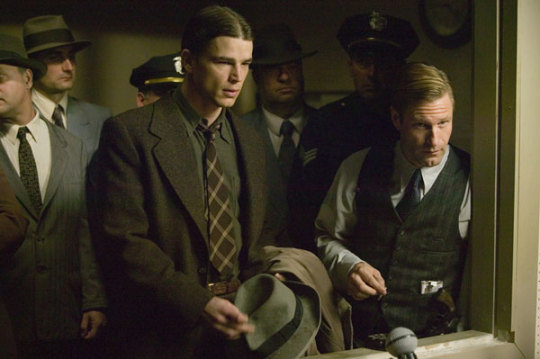
"THE BLACK DAHLIA" (2006) Review
Judging from the reactions among moviegoers, it seemed quite obvious that director Brian DePalma’s adaptation of James Ellroy’s 1987 novel had disappointed them. The ironic thing is that I do not share their feelings.
A good number of people – including a relative of mine – have told me that they had expected "THE BLACK DAHLIA" to be a docudrama of the infamous 1947 murder case. Others had expected the movie to be an epic-style crime drama similar to the 1997 Academy Award winning film, "L.A. CONFIDENTIAL" - another Ellroy adaptation. ”THE BLACK DAHLIA” proved to be neither for many fans. For me, it turned out to be an entertaining and solid film noir that I enjoyed.
Told from the point-of-view of Los Angeles Police detective Dwight “Bucky” Bleichert (Josh Harnett), ”THE BLACK DAHLIA” told the story of how the January 1947 murder of Hollywood star wannabe, Elizabeth Short aka “The Black Dahlia” (Mia Kershner) affected Bleichert’s life and the lives of others close to him – especially his partner, Lee Blanchard (Aaron Eckhart). The story began over three years before Short’s murder when Bleichert saved Blanchard’s life during the Zoot Riots in 1943. After World War II, the pair (who also happened to be celebrated local boxers) participated in an inter-departmental boxing match to help raise support for a political bond issue that will increase pay for the LAPD, but with a slight tax increase. Although Bleichert lost the match, both he and Blanchard are rewarded by Assistant District Attorney Ellis Loew (Patrick Fischler) with promotions and transfers to the Warrants Department and the pair became partners. Bleichert not only became partners and friends with Blanchard, he also became acquainted with Blanchard’s live-in girlfriend, a former prostitute and artist named Kay Lake (Scarlett Johansson). Although Bleichert fell in love with Kay, he kept his feelings to himself, due to his relationship with Blanchard. Thanks to Blanchard’s penchant for publicity, the two partners eventually participated in the murder investigation of Elizabeth Short (nicknamed the Black Dahlia). The case not only led the pair to a rich young playgirl named Madeleine Linscott (Hillary Swank) and her family, but also into a world of prostitution, pornography, lesbian nightclubs and the dark underbelly of Hollywood life.
Written by James Ellroy and originally published in 1987, ”The Black Dahlia” became the first of four novels about the Los Angeles Police Department in the post-World War II era (”L.A. Confidential” was the third in the quartet). In my opinion, it was the best in Ellroy’s L.A. Quartet. I believe that it translated quite well to the movie screen, thanks to DePalma’s direction and Josh Friedman’s screenplay. Like the movie ”L.A. CONFIDENTIAL”, ”THE BLACK DAHLIA” turned out to be superior to its literary version. Not only did DePalma and Friedman’s screenplay recapture the ambiance of the novel’s characters and 1940s Los Angeles setting, the plot turned out to be an improvement over the novel. Especially over the latter’s chaotic finale. Despite the improvement, ”THE BLACK DAHLIA” never achieved the epic style and quality of ”L.A. CONFIDENTIAL”. If I must be frank, I really do not care. Movies like the 1997 Oscar winner are rare occurrences of near perfect quality. Just because ”THE BLACK DAHLIA” was another film adaptation of an Ellroy novel, did not mean that I had expected it to become another ”L.A. CONFIDENTIAL”.
Mark Isham’s score for the film did not turn out to be that memorable to me. All I can say is that I am grateful that he did not attempt a remake of Jerry Goldsmith’s scores for ”L.A. CONFIDENTIAL” and ”CHINATOWN”. On the other hand, I was very impressed with Vilmos Zsigmond’s photography for the film. One sequence stood out for me – namely the overhead shot that featured the discovery of Elizabeth Short’s dead body in the Leimert Park neighborhood in Los Angeles. Ironically, part of the movie was shot in Sofia, Bulgaria substituting as 1946-47 Los Angeles. Production Designer Dante Ferretti and Art Director Christopher Tandon did a solid job in disguising Sofia as Los Angeles. But there were a few times when the City of Angels seemed like it was located on the East Coast. And I could spot a few palm trees that definitely looked false. However, I really loved the set designs for Kay’s home and the lesbian nightclub where Bleichert first met Madeline. I loved Jenny Beavan’s costume designs for the film. She did an excellent job of recapturing the clothing styles of the mid-to-late 1940s and designing clothes for particular characters.
One of the movie’s best strengths turned out to be its very interesting characters and the cast of actors that portrayed them. Characters that included the ambitious and sometimes malevolent ADA Ellis Loew, portrayed with great intensity by Patrick Fischler; Rose McGowan’s bitchy and shallow Hollywood landlady/movie extra; Elizabeth Short’s frank and crude father Cleo Short (Kevin Dunn); Mike Starr’s solid portrayal of Bleichert and Blanchard’s immediate supervisor Russ Millard; and Lorna Mertz, the young Hollywood prostitute portrayed memorably by Jemima Rooper. John Kavanagh and Fiona Shaw portrayed Madeline Linscott’s parents – a Scottish-born real estate magnate and his alcoholic California society wife. Kavanagh was charming and fun in a slightly corrupt manner, but Shaw hammed it up in grand style as the alcoholic Ramona Linscott. I doubt that a lesser actress could have pulled off such a performance.
Not only were the supporting characters memorable, so were the leading characters, thanks to the performances of the actors and actresses that portrayed them. I was very impressed by Mia Kershner’s portrayal of the doomed Elizabeth Short. She managed to skillfully conveyed Short’s desperation and eagerness to become a Hollywood movie star in flashbacks shown in the form of black-and-white audition clips and a pornographic film clip. At first, I found Scarlett Johansson as slightly too young for the role of Kay Lake, the former prostitute and artist that both Bleichert and Blanchard loved. She seemed a bit out of her depth, especially when she used a cigarette holder to convey her character’s sophistication. Fortunately, Johansson had ditched the cigarette holder and Kay’s so-called sophistication and portrayed the character as a warm and pragmatic woman, who turned out to be more emotionally mature than the other characters. I found Aaron Eckhart’s performance as the passionate, yet calculating Lee Blanchard great fun to watch. He seemed funny, sharp, verbose, passionate and rather manic all at once. There were times when his character’s growing obsession toward the Black Dahlia case seemed to border on histrionics. But in the end, Eckhart managed to keep it all together. Another performance I truly enjoyed was Hillary Swank’s portrayal of the sensual, rich playgirl Madeline Linscott. Just by watching Swank on screen, I got the impression that the actress had enjoyed herself playing Madeline. I know I had a ball watching her reveal the charming, yet dark facets of this interesting character.
Ellroy’s novel had been written in the first person – from the viewpoint of LAPD detective, Dwight “Bucky” Bleichert. Which meant that the entire movie had to focus around the actor who portrayed Bleichert. I once heard a rumor that Josh Harnett became interested in the role before casting for the movie actually began. In the end, many critics had either dismissed Hartnett’s performance or judged him incapable of portraying a complex character. Personally, I found their opinions hard – even impossible – to accept. For me, Harnett did not merely give a first-rate performance. He ”was” Dwight “Bucky” Bleichert. One must understand that Bleichert was a difficult role for any actor – especially a non-showy role that also had to keep the story together. Throughout the movie, Harnett, DePalma’s direction and Friedman’s script managed to convey the many complexities of Bleichert’s personality without being overtly dramatic about it. After all, Dwight was basically a quiet and subtle character. Harnett portrayed the character’s growing obsession with both the Black Dahlia case and Madeline Linscott without the manic and abrupt manner that seemed to mark Blanchard’s obsession. You know what? I really wish I could say more about Harnett’s performance. But what else can I say? He perfectly hit every nuance of Bleichert’s personality. I personally believe that Dwight Bleichert might be his best role to date.
I wish I could explain or even understand why ”THE BLACK DAHLIA” had flopped at the box office. Some have complained that the film had failed to match the epic qualities of ”L.A. CONFIDENTIAL”. Others have complained that it failed as a docudrama that would solve the true life murder of Elizabeth Short. And there have been complaints that Brian DePalma’s editing of a film that was originally three hours ruined it. I had never expected the movie to become another ”L.A. CONFIDENTIAL” (which did a mediocre job at the box office) – a rare case of near Hollywood perfection. I really do not see how a three hour running time would have helped ”THE BLACK DAHLIA”. It was a complex story, but not as much as the 1997 film. Hell, the novel was more straightforward than the literary L.A. Confidential”. And since the Hollywood publicity machine had made it clear that the movie was a direct adaptation of the novel, I found the argument that ”THE BLACK DAHLIA” should have been a docudrama that would solve Short’s murder rather ludicrous. Since I had read the novel back in the late 90s, I simply found myself wondering how DePalma would translate it to the movie screen.
In the end, I found myself more than satisfied with ”THE BLACK DAHLIA”. It possessed a first-rate cast led by a superb performance from Josh Harnett. Screenwriter Josh Friedman’s screenplay turned out to be a solid job that slightly improved Ellroy’s novel – especially the finale. And director Brian DePalma did an excellent job of putting it all together. I highly recommend it – if one does not harbor any high expectations.
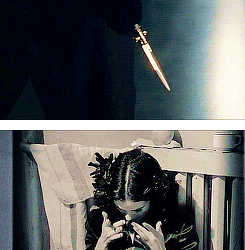
#brian de palma#the black dahlia#the black dahlia 2006#elizabeth short#los angeles history#james ellroy#josh harnett#scarlett johansson#aaron eckhart#hilary swank#mia kirshner#mike starr#richard blake#jemima rooper#fiona shaw#john kavanaugh#rose mcgowan#kevin dunn#old hollywood#period drama#period dramas#costume drama
20 notes
·
View notes
Text
Day #2 : My favorite 9 "villains"


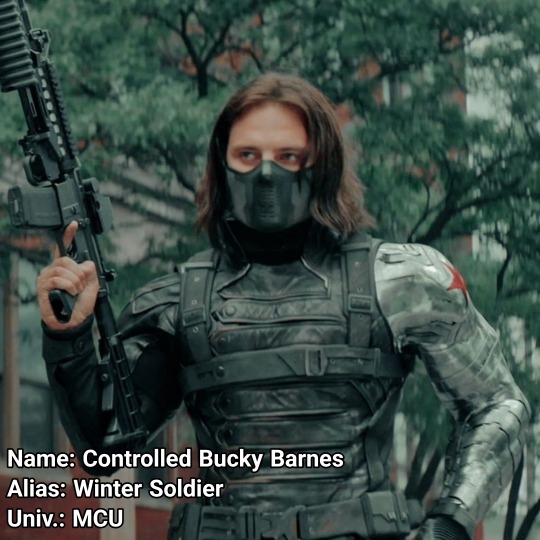

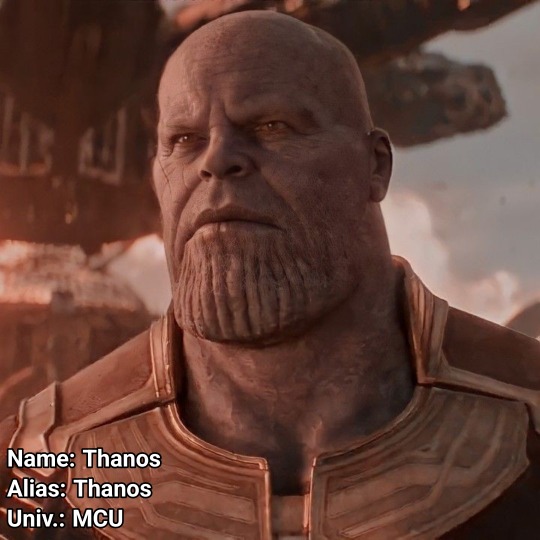


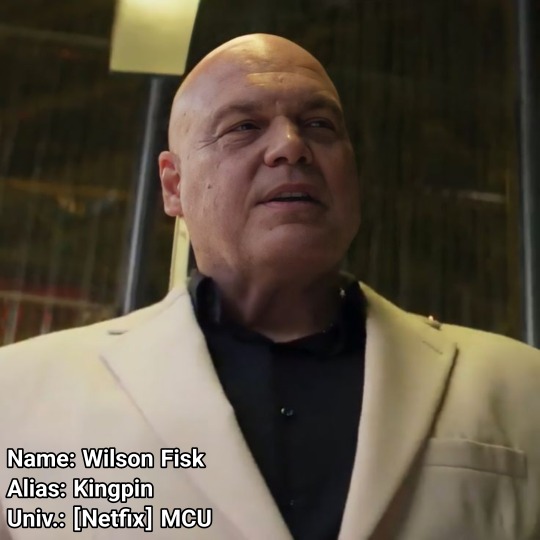

Day 2 of the Marvel Challenge -- 29/04/2023
#ava starr#ghost#kang the conqueror#kang#bucky barnes#winter soldier#loki laufeysdottir#loki#loki laufeyson#thanos#magneto#erik lehnsherr#elektra#elektra natchios#wilson fisk#kingpin#kevin thompson#kilgrave
29 notes
·
View notes
Text
youtube
Uncle Acid And The Deadbeats - Pomeriggio di novembre nel parco – Occhi che osservano
#uncle acid and the deadbeats#Pomeriggio di novembre nel parco – Occhi che osservano#kevin starrs#vaughn stokes#jon rice#justin smith#edwige fenech#franco nero#psychedelic rock#progressive rock#imaginary soundtrack#library music#giallo movies#nell'ora blu#2024#Youtube
3 notes
·
View notes
Text
Camp rock is the Jonas brothers a hard day’s night when you think about it
#camp rock#jonas brothers#a hard day's night#the Beatles#musicians#bands#nick jonas#joe jonas#kevin jonas#paul mccartney#john lennon#ringo starr#george harrison
8 notes
·
View notes
Text
An amazing fusion of Kevin Godley and the Beatles !!
youtube
#the beatles#paul mccartney#george harrison#Ringo Starr#john lennon#kevin godley#coolerstuff2#Youtube
3 notes
·
View notes
Text
Based on my recent statements regarding Paul McCartney and in light of the recent release of the new Beatles record, I would just like to clarify that I do not in any shape or form dislike Paul. I love him as I love the rest of them. I love him as one would love a brother. He has impacted my life as much as George, John and Ringo have. However, given the amount of time I have loved, adored and devoted myself to the Beatles (15 years this year), naturally I have also come to learn about their individual personalities. Paul has always come off as a perfectionist, and he, like many other artists I adore (Eric Stewart included) share this attribute. The difference between Eric and Paul (and i can’t help but make this comparison as they have worked extensively together over the years) is that Eric, though he is a perfectionist, he is open minded about constructive criticism. He takes what his fellow musicians tell him is wrong and applies it to his work. This is the reason why I think he and the rest of 10cc gained so much success, especially in the mid-70s when they were at their peak. 10cc never considered themselves “better” than anyone else. They wrote and recorded music simply because they loved doing it and they loved making their fans happy. The only big mistake that 10cc made that comes to mind is that they decided to work with the wrong record company who ended up using them as a money making machine. Had they signed with the record company that they had originally planned to sign with, they could’ve been far more successful. It has been said that they could’ve been just as successful as Pink Floyd and yes, even The Beatles. But I love that they have always been an obscure band. Who knows what kind of trouble they could’ve gotten themselves in had they been as big as the mighty Beatles?
Paul McCartney on the other hand (I love you Paul but I have some caveats about you that I want to share), although he is a brilliant songwriter (he’s ONE of the greatest but not the greatest imo) he fails to see through to people. My only wish is that Paul has changed and is more receptive to feedback from fellow musicians. After all, no great songwriter has ever succeeded without the help of their equals. Certainly, one could argue that Paul had John to bounce ideas off of, but when you think about the entire Beatles catalogue and take into consideration every Lennon-McCartney composition, all those songs were solely written by either Paul or John, not both (i.e John with “I Am The Walrus” and Paul with “Yesterday).
So I really hope that Paul has changed and has gained some form of humility over time.
Thank you for tuning in to my soapbox. Might happen again.
#the beatles#10cc#paul mccartney#john lennon#george harrison#ringo starr#eric stewart#lol creme#kevin godley#graham gouldman
5 notes
·
View notes
Text
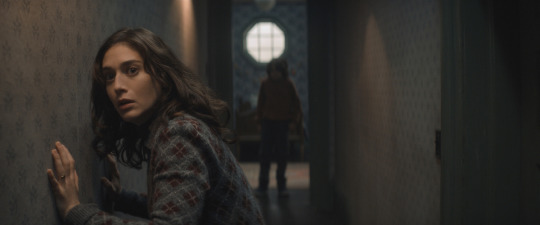
Cobweb, Samuel Bodin (2023)
#Samuel Bodin#Chris Thomas Devlin#Lizzy Caplan#Antony Starr#Cleopatra Coleman#Woody Norman#Luke Busey#Aleksandra Dragova#Philip Lozano#Drum & Lace#Kevin Greutert#Richard Riffaud#2023
3 notes
·
View notes
Text

Go make me jealous by watching Evil Uno against Kevin Ku in attendance 🙈 fr, please go if you can 💜
#evil uno#kevin ku#stu grayson#eddie kingston#lufisto#janai kai#addy starr#dan barry#terra callaway#cecil nyx#c4 wrestling#twitter#tweet
5 notes
·
View notes
Text
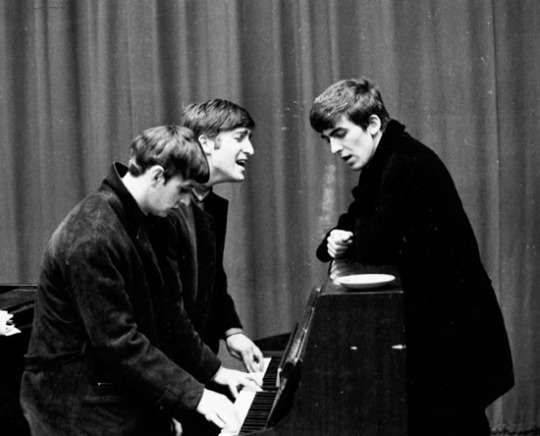
John Lennon, George Harrison and Ringo Starr relaxing during a recording session for Side By Side at the BBC Paris Theatre in Lower Regent Street, London, April 4, 1963. None of The Beatles songs recorded for the BBC featured piano playing.
ㅡ From the book "The Beatles: British Broadcasting Corporation (BBC Archives)" by Kevin Howlett.
#john lennon#george harrison#ringo starr#the beatles#60s#1963#the beatles bbc archives#kevin howlett#my:read
102 notes
·
View notes
Text
YOU DON'T UNDERSTAND. I NEED TO SEE UNCLE ACID IN CONCERT AGAIN. YOU REALLY DON'T UNDERSTAND.

#LISTENING TO THE LIVE ALBUM#AND I AM PICKING UP KEVIN STARRS AND I'M RATTLING HIM LIKE A WATER BOTTLE FULL OF BEANS.#I WISH THERE WERE NEW SONGS OUT#BUT I JUST AND SO FULL OF LONGING TO SEE THEM LIVE AGAIN#zombert.txt
1 note
·
View note